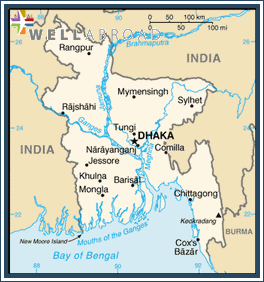|
MOST RECENT ALERTS
There's no recent alert.
|

|
|||||||||||||||
| COUNTRY OVERVIEW | ||||||||||||||||
|---|---|---|---|---|---|---|---|---|---|---|---|---|---|---|---|---|
|
| COUNTRY GENERAL INFORMATION | |||||||
|---|---|---|---|---|---|---|---|
| Language: |
Bangla |
||||||
| Currency: | Taka (BDT) | ||||||
| Predominant Religions: |
Muslim 83%, Hindu 16%, other 1% |
||||||
| National Holidays: | Independence Day, 26 March (1971) | ||||||
| Economic Status: |
The economy has grown 5-6% over the past few years despite inefficient state-owned enterprises, delays in exploiting natural gas resources, insufficient power supplies, and slow implementation of economic reforms. Bangladesh remains a poor, overpopulated, and inefficiently-governed nation. Although more than half of GDP is generated through the service sector, nearly two-thirds of Bangladeshis are employed in the agriculture sector, with rice as the single-most-important product. Garment exports and remittances from Bangladeshis working overseas, mainly in the Middle East and East Asia, fuel economic growth. |
||||||
| Security: |
Bangladesh Defense Force: Bangladesh Army, Bangladesh Navy, Bangladesh Air Force (Bangladesh Biman Bahini, BAF) |
||||||
| US Presence: |
|
||||||
| Document Requirements: |
A passport, visa and onward/return ticket are required. All travelers to Bangladesh, including American citizens, must have a valid visa in their valid passport prior to arrival. The United States is on a list of countries eligible for visitor (tourist) visas on arrival (landing permits). The country of Bangladesh has not widely publicized their policies for visas on arrival and travelers should be aware that delays may be encountered in airport visa issuance. Additionally, if issued, landing permit validity is usually limited to a maximum of fifteen days. A valid visa in an expired or canceled US passport is not acceptable to the Bangladeshi authorities; if you are issued a new US passport, you will need a new visa. |
||||||
| Major Airports: |
Airports: 16, Airports with paved runways: 15 Dhaka Airport, Bangladesh, House #11/A, Road #10, Sector #01, Uttara, Dhaka 1230, BANGLADESH Chittagong Airport, Bangladesh, Patenga, Chittagong, BANGLADESH |
||||||
| Servicing Airlines: |
|
||||||
| Risks and Precautions: |
Elections were held on December 29, 2008 and a new government was sworn in on January 6, 2009. The security situation in Bangladesh is fluid, and Americans are urged to check with the U.S. Embassy for the latest information. Spontaneous demonstrations take place in Bangladesh from time to time. US citizens are reminded that even demonstrations intended to be peaceful can turn confrontational and escalate into violence quickly and unexpectedly. US citizens are therefore urged to avoid the areas of demonstrations if possible, and to exercise caution if within the vicinity of any demonstrations. For this reason, the US Embassy recommends that US citizens proceed with caution in traveling to all universities and colleges in Dhaka at all times. The US Embassy also recommends that US citizens avoid Road 86 in the Gulshan-2 area of Dhaka. One of the major national political parties’ headquarters is located on this road. Large unscheduled events occur frequently and usually spill out on to the road, making it impassable. Baitul Mukarram Mosque (National Mosque),Muktangan (bordered by Baitul Mukarram Mosque to the east, the General Post Office or GPO to the south, the Secretariat to the West, and Topkhana Road to the North) , and Topkhana-Motijheel Road should be avoided on Fridays from noon to 6:00pm. |
||||||
| Mortality Statistics: |
Infant MR total: 64.32 deaths/1,000 live births |
||||||
| Immunization Indicators: |
Required: None |
||||||
| Infectious Disease Concerns: |
High risk of Malaria throughout the country, except Dhaka. |
||||||
| Overall Quality of Medical Services: |
Medical facilities in Bangladesh do not approach U.S. standards, even in tourist areas. There is no functioning emergency medical care system in Bangladesh. Prescription medication may be untrustworthy or unavailable. Medical evacuations to Bangkok or Singapore are often necessary for serious conditions. |
||||||
| Providers in Network: |
|
||||||
| Recent Medical Threats/ Concerns/Warnings: |
Highly pathogenic avian influenza (H5N1) continues to cause outbreaks in domestic and wild bird populations and has caused human cases in several South Asian countries. Avoid all direct contact with birds, including domestic poultry (such as chickens and ducks) and wild birds, and avoid places such as poultry farms and bird markets where live birds are raised or kept. For a current list of countries reporting outbreaks of H5N1 among poultry and/or wild birds, view updates from the World Organization for Animal Health (OIE), and for total numbers of confirmed human cases of H5N1 virus by country see the World Health Organization (WHO) Avian Influenza website. |
||||||
| Communications Info: |
Country Calling Code: +880 |
||||||






